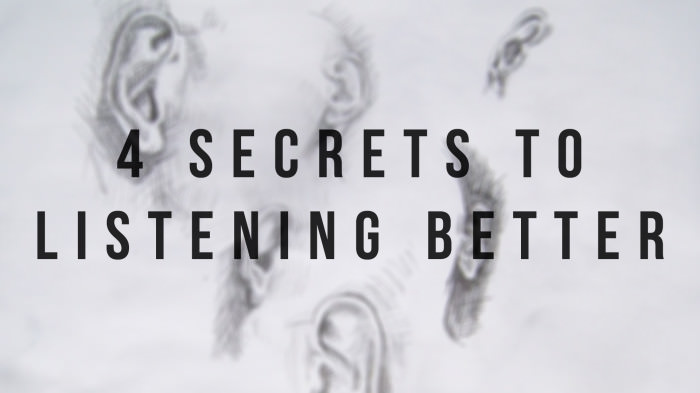I’ve been really passionate about listening recently. Mainly because there aren’t that many people that do it. One problem is that I don’t think people know how to listen well. The other problem is that I don’t think people understand the power of listening well. I used to think that I was a great listener until I had two incredible and life-giving conversations with a mentor of mine that changed everything for me. Not just in how I encountered my own brokenness, but in how I encountered the brokenness of others. Here are four of the qualities I have noticed in great listeners:
Be slow to speak. We are in ministry for a lot of reasons, one being our addiction to life change. We love seeing students’ testimonies unfold before our eyes. But the problem with that is we sometimes try to cut corners and expedite the process. When students tell us about an issue, we can be quick to give life advice and layout a plan to make it all better. But most times, people are just looking for someone to listen to them. Let them ask you for advice. Have them talk far more than you. Some of the best conversations I’ve had were with people that spoke maybe 15% of the time.
Make them your world. One of the most valuable things you can give someone is your time, but we cheapen that gift when we aren’t fully present. Whether it is checking your phone every five minutes or thinking about what you need to get done next, it can be such a struggle to make someone our world for just an hour. You want someone to open up to you? Be all in.
Ask Questions. Two of the biggest needs teenagers (and people in general) have are to feel known and to feel understood. One of the best ways to help meet these needs is to ask intentional questions. Ask questions that lead to discovery and for you to better understand them and for them to better understand themselves. In the midst of tragedy most people aren’t great at identifying their thoughts and feelings, so ask questions that help navigate them towards some kind of clarity.
Find the “why?” There is always a reason behind what we do. Never settle for what’s on the surface. It is impossible to compartmentalize our lives. Everything is connected to everything. So when something like an anger issue surfaces, the actual problem isn’t the student acting out, the real problem is something much bigger. Find that “bigger” thing.
What are some qualities that you would add to this list?
Colton

Leave A Comment